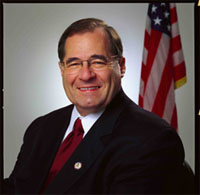LGBT housing bill faces long odds
Three weeks before the end of a session of Congress may seem an odd time to introduce any new bills, much less one dealing with always-contentious LGBT civil rights. But three representatives introduced a bill on December 8 that would better protect LGBT people from discrimination in housing.
The Housing Opportunities Made Equal (HOME) Act, introduced by Reps. Jerrold Nadler (D-N.Y.), John Conyers (D-Mich.), and Edolphus Towns (D-N.Y.), would amend the Fair Housing Act (FHA) to prohibit discrimination on the basis of sexual orientation, gender identity, source of income, or marital status in the sale, rental, financing, or brokerage of housing. It would also expand the FHA’s definition of “familial status” to include “anyone standing in loco parentis” to a minor—thus providing protection to same-sex couples and other families where one parent may not be legally recognized.
With LGBT legislative efforts focused on a repeal of the military’s “Don’t Ask, Don’t Tell” policy at the moment, however, there is unlikely to be any action on the new bill before the current session of Congress ends at the turn of the year. It will need to be reintroduced next session.
A spokesperson for Rep. Nadler, Ilan Kayatsky, said in an interview that little should be read into the timing of the introduction, other than that it was the culmination of a hearing process that began earlier in the current session.
“It’s really about building momentum,” he said. “We’re in it for the long haul.”
Nadler has held three subcommittee hearings this year to examine various ways in which the FHA could be improved, including one in March that addressed housing discrimination against LGBT people. The National Gay and Lesbian Task Force’s executive director, Rea Carey, was among the witnesses, and Joe Solmonese, president of the Human Rights Campaign (HRC), submitted written testimony.
The HOME bill replaces three similar but separate bills introduced by Reps. Nadler, Towns, and Joe Sestak (D-Penn.) earlier in the session. All three bills had been referred to the Judiciary Subcommittee on the Constitution, Civil Rights and Civil Liberties, which Nadler chairs and of which Towns is a member. Judiciary Committee Chair Conyers had been a co-sponsor of Nadler’s original bill. Sestak, however, lost his reelection campaign this past November.
The original FHA was enacted in 1968 in response to widespread housing discrimination against people of color. It prohibited discrimination based on race, color, religion, and national origin, and was later amended to include sex, disability, and familial status. Individuals seeking redress under the FHA may bring a lawsuit in federal district court or file an administrative complaint with the U.S. Department of Housing and Urban Development (HUD).
Twenty states plus the District of Columbia have additional housing protections based on sexual orientation, and 13 states plus the District have protections based on gender identity. Approximately 60 cities, towns, and counties have LGBT protections as well. There are no explicit federal protections.
But with Rep. Nadler losing the chair of his subcommittee next session because of the Republican majority, the new bill’s fate remains unclear.
Stacey Long, federal legislative director for the Task Force, said, “We will spend the next couple of years continuing to lobby around the legislation. Even though Congress is not likely to move on it, we will continue to use it as an education tool.”
Michael Cole-Schwartz, a spokesperson for the Human Rights Campaign, said that introducing the bill now “helps to jump start the conversation, to keep it in people’s minds.” An introduced bill, Cole-Schwartz explained, “gives a substantive nature to the lobbying and education that need to happen.”
HRC, the National Gay and Lesbian Task Force, and the Family Equality Council have been working on the bill as members of the Leadership Conference on Civil Rights, a coalition that includes various progressive communities involved with fair housing issues. Long said she was pleased many non-LGBT organizations have given their support to the HOME bill. They include the American Civil Liberties Union, the NAACP, National Consumer Law Center, the National Council of La Raza (the nation’s largest Latino rights organization), the National Fair Housing Alliance, and the National Urban League.
No national study has quantified how many LGBT people have faced housing discrimination, but at the March hearing, Carey cited small studies, court cases, and individual examples that paint a troubling picture of pervasive discrimination, especially against transgender people and LGBT seniors.
HUD is in the midst of preparing a national study to gain a better understanding of the extent and impact of anti-LGBT housing discrimination. The agency is designing it now, after collecting input earlier this year from a national listening tour and online submissions. A HUD spokesperson said the target date for reporting findings is late 2012.
Despite the lack of explicit federal protections, HUD on July 1 announced a clarification of existing policy, stating that although the FHA does not specifically cover sexual orientation- or gender identity-based discrimination, it may still cover them in other ways. For example, gender-identity discrimination may be seen as gender discrimination.
The HUD guidance also instructs staff to inform individuals about state and local LGBT protections that may apply to them. And HUD requires its grant applicants to comply with such state and local laws, when they exist.



I wish Florida would see that just because we are with someone of the same sex [doesn’t mean] that we wouldnt be good parents! I am trying to fight to get rights to my son. It has been nothing but a matter of no sleep, and a bunch of run around.
The impact of gender/sex discrimination in housing is deeply felt by many, including moms and families. You’re not alone if you’ve experienced it. We’ve heard from hundreds of moms about how they’ve faced discrimination from landlords and in mortgages. Add your story and read others here: http://bit.ly/d3Fs56